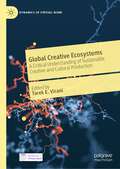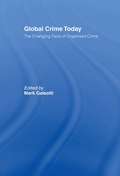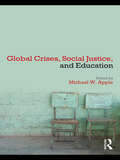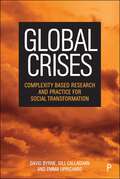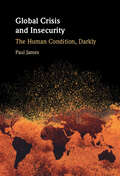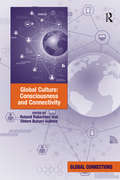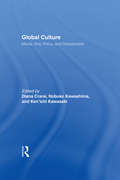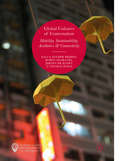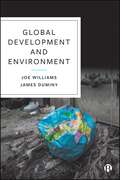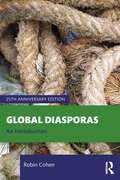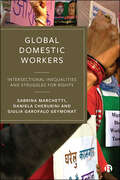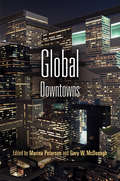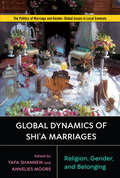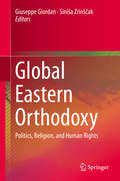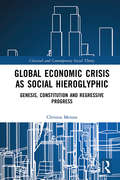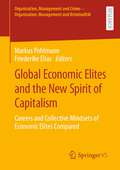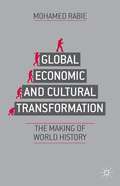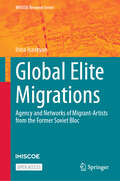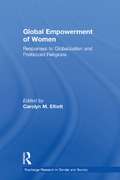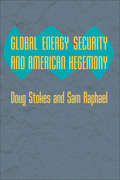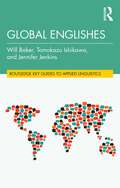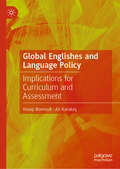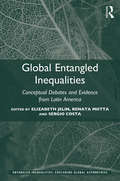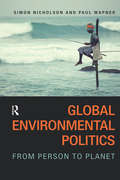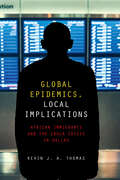- Table View
- List View
Global Creative Ecosystems: A Critical Understanding of Sustainable Creative and Cultural Production (Dynamics of Virtual Work)
by Tarek E. ViraniThis book reorients the lens of global creative economies in order to focus on ecological articulations of cultural production ecosystems. While numerous volumes and studies exist of how cities and regions all over the world produce culture, this volume uses a creative ecosystems perspective to articulate and underpin examples of sustainable growth and development with respect to cultural production.This volume offer a distinctive, in-depth understanding of how creative and cultural policy works in cities from around the world – not solely from academic or policy perspectives but including practitioners as well. The book aims to question and reformulate policy as it has been developed through creative industries approaches and instead offer up different examples and approaches to regional development with a focus on cultural production. The book carves a creative economy policy-oriented path of development that reflects the real world.
Global Crime Today: The Changing Face of Organised Crime
by Mark GaleottiCrime is recognized as a constant factor within human society, but in the twenty-first century organized crime is emerging as one of the distinctive security threats of the new world order. The more complex, organized and interconnected society becomes, its crime becomes too. This book recognizes that the new century will be defined in part by a struggle between an ‘upperworld’, defined by increasingly open economic systems and democratic politics, and a transnational, entrepreneurial, dynamic and richly varied underworld, willing and able to use and distort these trends for its own ends. In order to understand this challenge, this book gathers together experts from a variety of fields to understand how organized crime is changing. From the Sicilian Mafia and the Japanese Yakuza, to the new challenges of Russian and East European gangs and the ‘virtual mafias’ of the cybercriminals, this book offers a clear and concise introduction to many of the key players moving in this global criminal underworld. This book is a special issue of Global Crime
Global Crises, Social Justice, and Education
by Michael W. AppleEducation cannot be understood today without recognizing that nearly all educational policies and practices are strongly influenced by an increasingly integrated international economy. Reforms in one country have significant effects in others, just as immigration and population tides from one area to another have tremendous impacts on what counts as official knowledge and responsive and effective education. But what are the realities of these global crises that so many people are experiencing and how do their effects on education resonate throughout the world? Global Crises, Social Justice, and Education looks into the ways we understand globalization and education by getting specific about what committed educators can do to counter the relations of dominance and subordination around the world. From some of the world’s leading critical educators and activists, this timely new collection provides thorough and detailed analyses of four specific centers of global crisis: the United States, Japan, Israel/Palestine, and Mexico. Each chapter engages in a powerful and critical analysis of what exactly is occurring in these regions and counters with an equally compelling critical portrayal of the educational work being done to interrupt global dominance and subordination. Without settling for vague ideas or romantic slogans of hope, Global Crises, Social Justice, and Education offers real, concrete examples and strategies that will contribute to ongoing movements and counter-hegemonic struggles already active in education today.
Global Crises: Complexity Based Research and Practice for Social Transformation
by David Byrne Gill Callaghan Emma UprichardIn today’s world, there are interwoven crises affecting us at every level. This book explores the impact of these crises on applied social research. It shows how using a complexity framework in research is key to tackling global challenges effectively. By featuring illustrative examples from the UK, China, Brazil, South Africa and the US, the authors demonstrate how an action research programme based around the use of existing social research methods embedded in processes of co-production and participation can drive real-time social change. In doing so, the book highlights the transformative role of action-oriented research in addressing today's complex global challenges.
Global Crisis and Insecurity: The Human Condition, Darkly
by Paul JamesFrom the dropping of an atomic bomb on Hiroshima, to the escalating effects of climate change, public consciousness of existential threat waxes and wanes. Despite the occasional intense capacity to imagine the global consequences of our cumulative actions, we seem to lack a collective will to act alternatively and systematically to conserve the fundamental conditions for human life. This book confronts the basic challenges of insecurity, violence, genocide, refugee displacement and technoscientific intrusions on embodiment and identity – but it also points to other worlds that are possible. It argues for an engaged cosmopolitanism, grounded in place and guided by local and global debates around principles of what constitutes good ways of living. In order to create a positive change, we must better understand the human condition in crisis, the causes of the global crisis and the possible pathways to human flourishing.
Global Culture: Consciousness And Connectivity (Global Connections #16)
by Roland Robertson Didem Buhari-GulmezThe current discourse of globalization is overwhelmingly centred upon the interconnectedness, or connectivity, of the contemporary world; to the great neglect of the issues of global culture and global consciousness. With contemporary worldwide culture increasingly characterized by such themes as astronomy, cosmology, space travel and exploration, there is an increasing disjuncture between academic concern with connectivity, on the one hand, and culture and consciousness of the place of planet earth in the cosmos as a whole, on the other. This book addresses this deficiency from a variety of closely related perspectives, presenting studies of religion, science, sport, international organizations, global resistance movements and migrations and developments in East Asia. It brings together the latest theoretical empirical work from scholars in the US, UK, Australia, Japan, China and Israel on the significance of culture and global consciousness. As such, Global Culture: Consciousness and Connectivity will be of great interest to scholars across and beyond the social sciences working in the areas of global studies, cultural studies, social theory, the sociology of religion and related issues.
Global Culture: Media, Arts, Policy, and Globalization
by Diana Crane Nobuko Kawashima Ken’ichi KawasakiFirst published in 2002. Routledge is an imprint of Taylor & Francis, an informa company.
Global Cultures of Contestation: Mobility, Sustainability, Aesthetics & Connectivity (Palgrave Studies in Globalization, Culture and Society)
by Esther Peeren Thomas Poell Robin Celikates Jeroen De KloetThis book guides the reader through the many complications and contradictions that characterize popular contestation today, focusing on its socio-political, cultural, and aesthetic dimensions. The volume recognizes that the same media and creative strategies can be used to pursue very different causes, as the anti-gay marriage Manif Pour Tous movement in France makes clear. The contributors are scholars from the humanities and social sciences, who analyze protests in particular regions, including Egypt, Iran, Australia, France, Spain, Greece, and Hong Kong, and transnational protests such as the NSA-leaks and the mobilization of migrants and refugees. Not only the specificity of these protest movements is examined, but also their tendency to connect and influence each other, as well as the central, often ambiguous role global digital platforms play in this.
Global Development and Environment
by Joe Williams James DuminyAvailable open access digitally under CC-BY licence. Development and environmental challenges are often framed at the global or planetary scale, but in a vague or apolitical manner. This book develops a theoretically rigorous and politicized concept of the planetary to intervene in contemporary debates on global development and to enhance our critical understanding of development as we approach the second quarter of the twenty-first century. Chapters explore key themes and processes including urbanization, demographic change, health, financialization, and infrastructure development. Referencing diverse cases and examples drawn from across the world, the book argues that the futures of global development are inseparable from environmental challenges and transformations.
Global Diasporas: An Introduction
by Robin CohenFollowing its initial publication in 1997, Global Diasporas: An Introduction was central to the emergence of diaspora studies and quickly established itself as the leading textbook in the field. This expanded and fully-revised 25th anniversary edition adds two new chapters on incipient diasporas and diaspora engagement while carefully clarifying the changing meanings of the concept of diaspora and incorporating updated statistics and new interpretations seamlessly into the original text. The book has also been made more student-friendly with illustrations, thought-provoking questions, and guides to further reading. The book features insightful case studies and compares a wide range of diasporas, including Jewish, Armenian, African, Sikh, Chinese, British, Indian, Lebanese, Afghan and Caribbean peoples. This edition also retains Cohen’s rich historical and sociological descriptions and clear yet elegant writing, as well as his modified concept of ‘diasporic rope’ linking different features of diasporas. This updated edition of the definitive textbook in the field will be an indispensable guide for students and instructors seeking to explore the complex issues of diaspora, migration and identity.
Global Domestic Workers: Intersectional Inequalities and Struggles for Rights
by Sabrina Marchetti Daniela CherubiniEPDF and EPUB available Open Access under CC-BY-NC licence. Drawing from the EU-funded DomEQUAL research project across 9 countries in Europe, South America and Asia, this comparative study explores the conditions of domestic workers around the world and the campaigns they are conducting to improve their labour rights. The book showcases how domestic workers’ movements put ‘intersectionality in action’ in representing the interest of various marginalized social groups from migrants and low-income groups to racialized and rural girls and women. Casting light on issues such as subjectification, and collective organizing on the part of a category of workers conventionally regarded as unorganizable, this ambitious volume will be invaluable for scholars, policy makers and activists alike.
Global Downtowns
by Marina Peterson Gary McdonoghGlobal Downtowns reconsiders one of the defining features of urban life--the energy and exuberance that characterize downtown areas--within a framework of contemporary globalization and change. It analyzes the iconic centers of global cities through individual case studies from Europe, Asia, Africa, Latin America, and the United States, considering issues of function, population, imagery, and growth. Contributors to the volume use ethnographic and cultural analysis to identify downtowns as products of the activities of planners, power elites, and consumers and as zones of conflict and competition. Whether claiming space on a world stage through architecture, media events, or historical tourism or facing the claims of different social groups for a place at the center, downtowns embody the heritage of the modern city and its future.Essays draw on extensive fieldwork and archival study in Beijing, Barcelona, New York, Los Angeles, Chicago, Dar es Salaam, Dubai, Nashville, Lima, Philadelphia, Mumbai, Havana, Beirut, and Paris, among other cities. They examine the visions of planners and developers, cultural producers, governments, theoreticians, immigrants, and outcasts. Through these perspectives, the book explores questions of space and place, consumption, mediation, and images as well as the processes by which urban elites learn from each other as well as contest local hegemony.Global Downtowns raises important questions for those who work with issues of urban centrality in governance, planning, investment, preservation, and social reform. The volume insists that however important the narratives of individual spaces--theories of American downtowns, images of global souks, or diasporic formations of ethnic enclaves as interconnected nodes--they also must be situated within a larger, dynamic framework of downtowns as centers of modern urban imagination.
Global Dynamics of Shi'a Marriages: Religion, Gender, and Belonging (Politics of Marriage and Gender: Global Issues in Local Contexts)
by Mary Elaine Hegland Yafa Shanneik Annelies Moors Anna-Maria Walter Jihan Safar Marianne Hafnor Bøe Eva Nisa Sophie Yvie Girard Tara AsgarilalehMuslim marriages have been the focus of considerable public debate in Europe and beyond, in Muslim-majority countries as well as in settings where Muslims are a minority. Most academic work has focused on how the majority Sunni Muslims conclude marriages. This volume, in contrast, focuses on Twelver Shi'a Muslims in Iran, Pakistan, Oman, Indonesia, Norway, and the Netherlands. The volume makes an original contribution to understanding the global dynamics of Shi'a marriage practices in a wide range of contexts--not only its geographical spread but also by providing a critical analysis of the socio-economic, religious, ethnic, and political discourses of each context. The book sheds light on new marriage forms presented through a bottom up approach focusing on the lived experiences of Shi'a Muslims negotiating a diverse range of relationships and forms of belonging.
Global Eastern Orthodoxy: Politics, Religion, and Human Rights
by Giuseppe Giordan Siniša ZrinščakThis volume highlights three intertwined aspects of the global context of Orthodox Christianity: religion, politics, and human rights. The chapters in Part I address the challenges of modern human rights discourse to Orthodox Christianity and examine conditions for active presence of Orthodox churches in the public sphere of plural societies. It suggests theoretical and empirical considerations about the relationship between politics and Orthodoxy by exploring topics such as globalization, participatory democracy, and the linkage of religious and political discourses in Russia, Greece, Belarus, Romania, and Cyprus. Part II looks at the issues of diaspora and identity in global Orthodoxy, presenting cases from Switzerland, America, Italy, and Germany. In doing so, the book ties in with the growing interest resulting from the novelty of socio-political, economic, and cultural changes which have forced religious groups and organizations to revise and redesign their own institutional structures, practices, and agendas.
Global Economic Crisis as Social Hieroglyphic: Genesis, Constitution and Regressive Progress (Classical and Contemporary Social Theory)
by Christos MemosThis book examines the 2008 global economic crisis as a complex social phenomenon or "social hieroglyphic", arguing that the crisis is not fundamentally economic, despite presenting itself as such. Instead, it is considered to be a symptom of a long-standing, multifaceted, and endemic crisis of capitalism which has effectively become permanent, leading contemporary capitalist societies into a state of social regression, manifest in new forms of barbarism. The author offers a qualitative understanding of the economic crisis as the perversion, or inversion, of the capitalistically organized social relations. The genesis of the current crisis is traced back to the unresolved world crisis surrounding the Great Depression in order to map the course and different "inverted forms" of the continuous global crisis of capitalism, and to reveal their inner connections as derivative of the same social constitution. From a historical and interdisciplinary perspective, the book expounds critical social theory, elaborating on the intersection between the early critical theory of the Frankfurt School – mainly Adorno, Horkheimer, and Marcuse – and the "social form" analysis of the Open Marxism school. Global Economic Crisis as Social Hieroglyphic critically addresses the permanent character of the 1920s–1930s crisis and the "crisis theory" debates; the political crisis in Eastern Europe (1953–1968); the crisis of Keynesianism; the crisis of subversive reason; the crisis, negative anthropology and transformations of the bourgeois individual; the state of social regression and the destructive tendencies after the rise of neoliberalism; and finally, the 2008 financial crisis and its ongoing aftermath.
Global Economic Elites and the New Spirit of Capitalism: Careers and Collective Mindsets of Economic Elites Compared (Organization, Management and Crime - Organisation, Management und Kriminalität)
by Markus Pohlmann Friederike EliasIs a new spirit of capitalism emerging as a result of neoliberal adjustments in the global economy? The internationalization of management and its comprehensive neoliberals imprint fall short of the assumptions represented by globalization theory. Empirical data on the life trajectories and action orientations of CEOs from leading industrial companies in nine countries across Europe, Asia, and Latin America indicate that local institutional frameworks, diverse regional challenges, and historically embedded cultural influences exert more significant influence than global trends. Different strategies and structures have been identified based on problem-centered interviews with top executives, and they are made accessible for the first time in English for comparative purposes.
Global Economic and Cultural Transformation
by Mohamed RabieSociety today faces multi-dimensional challenges that are hard to define and even harder to deal with. Social and economic systems throughout the world are becoming more complex and interdependent, and globalization is moving beyond the sphere of economics to engulf other aspects of life, particularly culture and security. Our current theories, strategies, and road maps are fast becoming out-dated and no new ones have emerged to take their place. Mohamed Rabie re-examines the relevance of major ideas and systems of the recent past, including ideology and its relation to society in Global Economic and Cultural Transformation. This book is an attempt defines and explains this transitional period and provides a new conception of economic and societal world history, which us understand how we got here and where we are going.
Global Elite Migrations: Agency and Networks of Migrant-Artists from the Former Soviet Bloc (IMISCOE Research Series)
by Irina IsaakyanThis open access book explores the lives and careers of migrating artists with the purpose to understand how they make use of their migrant-networks and how this process interacts with decisions they make about immigration and career development. Situated at the crossroads of Migration Studies and Elite Studies, this interdisciplinary research is based on sixty interpretive biographic interviews with opera singers from the former Soviet bloc who work in various places across Europe and beyond. The book raises the question to what extent they exercise agency as migrants and professionals and to what extent they preserve their professional elitism on the transnational level. The case of these migrant-artists serves to illuminate the dynamics of a wider phenomenon - global elite migrations - which is compared with an intergalactic journey. Through this sociological metaphor, the book offers a new analytical framework to think about the “agency-network” nexus.
Global Empowerment of Women: Responses to Globalization and Politicized Religions (Routledge Research in Gender and Society #Vol. 15)
by Carolyn M. ElliottThe empowerment of women is a broadly endorsed strategy for solving a host of difficult problems, from child poverty to gender violence to international development. The seventeen international scholars in this multi-disciplinary volume offer thoughtful critiques of the notion of empowerment based on their studies in twenty countries in all regions of the world. The comparative introduction places concepts of empowerment in the context of models of the market and of community, showing how contradictions in these models as they are enacted on the ground provide both spaces and constraints for women. The chapters consider opportunities for women in the context of globalization, resurgent nationalism and politicized religion, cultures of masculinity, and the HIV/AIDS epidemic in Africa. They show how initiatives at national or global levels are transformed by local cultures and power structures, and demonstrate the fruitfulness of tensions between universal values of human rights and contextualized understandings. This landmark, multi-disciplinary collection of original studies by distinguished international feminist scholars will be an essential addition to the fields of Political Science, Women’s Studies, Economics, Sociology, International Development, and Environmental Studies.
Global Energy Security and American Hegemony (Themes in Global Social Change)
by Doug Stokes Sam RaphaelThis analysis of the United States and energy security examines the close relationship between US military supremacy in oil-rich regions and America's maintenance of global power.Energy security generally evokes thoughts of American intervention in the Middle East to protect US interests in that region's oil-rich fields. Doug Stokes and Sam Raphael move beyond that framework to consider US actions in Latin America, Central Asia, and Africa. Drawing on State and Defense Department records and other primary sources and previous scholarship, they show how US foreign policy since World War II has sought to maintain a global energy security regime that supports the nation's allies while maintaining American hegemony. Stokes and Raphael explain how US intervention in energy-rich states insulates and stabilizes those nations' transnationally oriented actors and political economies and why American oil diversification strategy strengthens the country's position against rivals in the global capitalist system. They argue that counterinsurgency aid and other types of coercive US statecraft protect the recipient states from an array of potentially revolutionary armed and unarmed internal social forces, thereby securing the energy supplies of nations deemed strategically important to the United States or its allies. Clear and accessible, this cutting-edge contemporary policy analysis will engage scholars of US foreign policy and international relations as well as policymakers grappling with the importance of energy security in today's world.
Global Englishes (Routledge Key Guides to Applied Linguistics)
by Jennifer Jenkins Will Baker Tomokazu IshikawaThe global spread of English, with over two billion users of the language, is now well-documented. English functions as a language of education, business, tourism, and intercultural communication in many settings across the world. Global Englishes offers a clear and comprehensive overview of key areas of the topic, encompassing both World Englishes and English as a Lingua Franca (ELF) within a single volume.This engaging textbook offers readers the opportunity to reflect on key debates as well as develop their own thinking on real-world language practices and problems in light of Global Englishes theory and research. Organised into a three-part Survey, followed by readings from important texts, this is both an introductory textbook covering key concepts and themes, and a starting point for further study. It is essential reading for students of Global/World Englishes and ELF in applied linguistics, sociolinguistics, English language teaching, and intercultural communication.
Global Englishes and Language Policy: Implications for Curriculum and Assessment
by Ali Karakaş Yusop BoonsukThis book provides a comprehensive exploration of the pedagogical implications of Global Englishes for language policy, curriculum design, and assessment. Drawing on current research and practice, the book offers practical guidance for language teachers and curriculum designers, examining the relationship between language policy and curriculum design, and highlighting the importance of assessment in the context of Global Englishes. Over the past few decades, English has emerged as a global lingua franca, used by speakers from diverse linguistic and cultural backgrounds to communicate with one another. However, many English language teachers and curriculum designers are still grappling with the practical implications of Global Englishes. This book addresses this gap and will be an essential resource for language teachers, as well as students and scholars in areas including Language Education, Applied Linguistics, TESOL and English Language Teaching.
Global Entangled Inequalities: Conceptual Debates and Evidence from Latin America (Entangled Inequalities: Exploring Global Asymmetries)
by Renata Motta Elizabeth Jelin Sérgio CostaThis book presents studies from across Latin America to take up the challenge of exploring the plurality of social inequalities from a global perspective. Accordingly, it identifies the structural forces of social inequalities on a world scale as they shape asymmetries observed in a wide array of phenomena, such as racial and gender inequality, urbanization, migration, commodity production, indigenous mobilization, ecological conflicts, and the "new middle class". A rich contribution to the study of the interconnections between the global social structure and multiple local and national hierarchies, Global Entangled Inequalities brings consistently together a variety of conceptual approaches, ranging from ethnographies to legal genealogies, and will therefore appeal to scholars across the social sciences with interests in social theory, power analysis, intersectionality studies, urban studies, and global social and environmental justice.
Global Environmental Politics: From Person to Planet
by Paul Wapner Simon NicholsonToday's students want to understand not only the causes and character of global environmental problems like climate change, species extinction, and freshwater scarcity, but also what to do about them. This book offers the most comprehensive, fair-minded, accessible, and forward-looking text for introducing students to the challenge of global environmental protection. Drawing on a diverse range of voices, the book sequentially explains our current predicament, examines what is being done to respond at a variety of levels from the international to the local, and outlines different, relevant strategic choices for genuine political engagement. Developed by two top researchers and master teachers of global environmental politics, the book brings together sharply written introductory essays with tightly edited selections from a broad cross section of thinkers to provide a text that will excite and educate students of global environmental affairs. In addition, the book introduces a series of exercises designed specifically to help students draw connections between their own lives and the broader challenge of global sustainability. Global Environmental Politics: From Person to Planet finally answers the question of how to teach students about environmental harm with a sober sense of ecological reality, a firm grasp on politics, and an optimistic look toward the future. Features of This Innovative Text Reader: Original section introductions by the volume editors cover key topics such as the four major planetary challenges (climate, extinction, water, and food); leading causes of environmental harm; the role of states, markets, and civil society; race, class, and geopolitical difference; and the value of thinking strategically and using a broad political imagination. Carefully selected and judiciously edited readings from a wide range of sources feature high-profile authors from popular as well as specialist media. Action-oriented exercises engage students in being part of the solution.
Global Epidemics, Local Implications: African Immigrants and the Ebola Crisis in Dallas
by Kevin J. ThomasHow fear and stigma affected the lives of African immigrants during the global Ebola epidemic—and the resilient ways in which immigrant communities responded.In December 2013, a series of Ebola infections in Meliandou, Guinea, set off a chain of events culminating in the world's largest Ebola epidemic. Concerns about the virus in the United States reached a peak when Thomas Duncan, a Liberian national visiting family in Dallas, became the first person to be diagnosed with Ebola and die of the disease on US soil. In Global Epidemics, Local Implications, Kevin J. A. Thomas highlights the complex ways in which disease outbreaks that begin in one part of the world affect the lives of immigrants in another. Drawing on information from a community survey, participant observations, government documents, and newspapers, Thomas examines how African immigrants were negatively affected by public backlash and their agency and resilience in responding to the consequences of epidemic. Ultimately, this book shows how these responses underscore the importance of immigrant resources for developing public health interventions.
